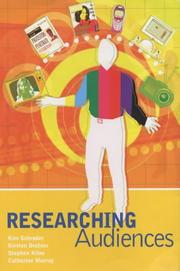| Listing 1 - 10 of 11 | << page >> |
Sort by
|

ISBN: 0340762756 0340762748 9780340762745 Year: 2003 Publisher: London: Hodder education,
Abstract | Keywords | Export | Availability | Bookmark
 Loading...
Loading...Choose an application
- Reference Manager
- EndNote
- RefWorks (Direct export to RefWorks)
Mass communications --- #SBIB:041.AANKOOP --- #SBIB:309H400 --- marktonderzoek --- 369.1 --- 316.775.4 --- Media en publieksgroepen: algemene werken --- marketing, marktonderzoek, marktanalyse --- Publieksgroepen in het communicatieproces: toehoorders, toeschouwers, lezers --- Mass media --- Pedagogiek en onderwijskunde --- --Audiences --- Research. --- Influence --- Pedagogiek en onderwijskunde --. --- Audiences --- 316.775.4 Publieksgroepen in het communicatieproces: toehoorders, toeschouwers, lezers --- Mass communication --- Media, Mass --- Media, The --- Communication --- Audiences&delete& --- Research --- Influence&delete& --- Mass media - Audiences - Research --- Mass media - Influence - Research
Book
ISBN: 041506385X 0415063841 9780415063845 9780415063852 Year: 1992 Publisher: London: Routledge,
Abstract | Keywords | Export | Availability | Bookmark
 Loading...
Loading...Choose an application
- Reference Manager
- EndNote
- RefWorks (Direct export to RefWorks)
Mass media --- Popular culture --- Communication, International --- Intercultural communication --- 316.774.16 --- 316.774.12 --- #SBIB:309H1016 --- #A9305A --- Popular culture. --- Culture, Popular --- Mass culture --- Pop culture --- Popular arts --- Communication --- Intellectual life --- Mass society --- Recreation --- Mass communication --- Media, Mass --- Media, The --- Cross-cultural communication --- Culture --- Cross-cultural orientation --- Cultural competence --- Multilingual communication --- Technical assistance --- International communication --- World communication --- Massamedia: maatschappelijk, politiek, ideologisch, ethisch, juridisch, socio-cultureel--(communicatiesociologie) --- Massamedia. communicatiepolitieke aspecten--(communicatiesociologie) --- Media: socio-culturele aspecten (massamedia en maatschappij, met inbegrip van cultuurhistorische werken en werken over de maatschappelijke en politieke effecten van de (diverse) media) --- Anthropological aspects --- Communication, International. --- Intercultural communication. --- Mass media. --- 316.774.12 Massamedia. communicatiepolitieke aspecten--(communicatiesociologie) --- 316.774.16 Massamedia: maatschappelijk, politiek, ideologisch, ethisch, juridisch, socio-cultureel--(communicatiesociologie)
Book
ISBN: 1433106957 9781433106958 Year: 2010 Publisher: New York: Lang,
Abstract | Keywords | Export | Availability | Bookmark
 Loading...
Loading...Choose an application
- Reference Manager
- EndNote
- RefWorks (Direct export to RefWorks)
Information technology --- Computers --- Internet in education --- Web 2.0

ISBN: 0631127437 063110741X 9780631107415 9780631127437 Year: 1985 Volume: 9 Publisher: Oxford : Blackwell,
Abstract | Keywords | Export | Availability | Bookmark
 Loading...
Loading...Choose an application
- Reference Manager
- EndNote
- RefWorks (Direct export to RefWorks)
Advertising --- Language. --- #KVHA:Reclametaal; Engels --- #KVHA:Teksttypologie; Engels --- 802.0-086 --- -#SBIB:309H2821 --- reclameteksten --- 659.1 --- Ads --- Advertisements --- Advertising, Consumer --- Advertising, Retail --- Advertising, Store --- Commercial speech --- Consumer advertising --- Retail advertising --- Speech, Commercial --- Store advertising --- 659.1 Publicity. Advertising --- Publicity. Advertising --- 802.0-086 Engels: slang; vaktaal; jeugdtaal --- Engels: slang; vaktaal; jeugdtaal --- Language --- Reclameboodschap: functies, genres, taalgebruik historiek --- Retail trade --- #SBIB:309H2821 --- reclamepsychologie --- Sociolinguistics --- Advertising. Public relations --- reclameboodschappen --- Social psychology --- Reclameteksten --- taalkundige studies. --- Publicité --- Langage --- Taalkundige studies. --- Advertising - Language
Book
ISBN: 9781138100961 9780415827362 9780203523162 9781134064472 9781134064540 9781134064618 0415827361 0203523164 Year: 2014 Volume: 1 Publisher: New York (N.Y.): Routledge,
Abstract | Keywords | Export | Availability | Bookmark
 Loading...
Loading...Choose an application
- Reference Manager
- EndNote
- RefWorks (Direct export to RefWorks)
The concept of the audience is changing. In the twenty-first century there are novel configurations of user practices and technological capabilities that are altering the way we understand and trust media organizations and representations, how we participate in society, and how we construct our social relations. This book embeds these transformations in a societal, cultural, technological, ideological, economic and historical context, avoiding a naive privileging of technology as the main societal driving force, but also avoiding the media-centric reduction of society to the audiences that are situated within. Audience Transformations provides a platform for a nuanced and careful analysis of the main changes in European communicational practices, and their social, cultural and technological affordances.
Mass communications --- Europe --- #SBIB:309H400 --- Media en publieksgroepen: algemene werken --- Mass media --- Audiences --- Audiences. --- Médias --- Publics --- Mass media - Audiences
Digital
ISBN: 9781138676305 9781315560168 Year: 2019 Publisher: London Routledge, Taylor & Francis Group
Abstract | Keywords | Export | Availability | Bookmark
 Loading...
Loading...Choose an application
- Reference Manager
- EndNote
- RefWorks (Direct export to RefWorks)
Documentation and information --- Museology --- Mass communications
Book

ISBN: 9789463004145 9463004149 9463004122 9789463004121 9789463004138 9463004130 Year: 2016 Publisher: Rotterdam : SensePublishers : Imprint: SensePublishers,
Abstract | Keywords | Export | Availability | Bookmark
 Loading...
Loading...Choose an application
- Reference Manager
- EndNote
- RefWorks (Direct export to RefWorks)
Developments within the “knowledge society,” especially those resulting from technological innovation, have intensified an interest in the relationship between different contexts and multiple sites of learning across what is often termed as formal, non-formal and informal learning environments. The aim of this book is to trace learning and experience across multiple sites and contexts as a means to generate new knowledge about the borders and edges of different practices and the boundary crossings these entail in the learning lives of young people in times of dynamic societal, environmental, economic, and technological change. The empirical research discussed in this book has grown out of a Nordic network of researchers. The research initiatives in the Nordic countries tend to avoid the more spectacular debates over the future of the educational institutions that tend to dominate and obscure discussions on education in the knowledge society, and which look to models of informal learning, whether in the “learning communities” of workplaces and families or in the new socio-technical spaces of the Internet, as a source of alternative educational strategies. Rather, Nordic researchers more modestly ask whether it is possible to envisage new models of teaching and learning which take seriously both the responsibility to social justice and social wellbeing, which, at least rhetorically, underpinned a commitment to mass education of the 20th century, as well as to the radical challenges to traditional educational models offered by the new socio-technical spaces and practices of the 21st century. .
Teaching --- onderwijs --- opvoeding --- Education. --- Education, general. --- Children --- Education, Primitive --- Education of children --- Human resource development --- Instruction --- Pedagogy --- Schooling --- Students --- Youth --- Civilization --- Learning and scholarship --- Mental discipline --- Schools --- Training --- Education
Digital

ISBN: 9789463004145 Year: 2016 Publisher: Rotterdam SensePublishers
Abstract | Keywords | Export | Availability | Bookmark
 Loading...
Loading...Choose an application
- Reference Manager
- EndNote
- RefWorks (Direct export to RefWorks)
Developments within the “knowledge society,” especially those resulting from technological innovation, have intensified an interest in the relationship between different contexts and multiple sites of learning across what is often termed as formal, non-formal and informal learning environments. The aim of this book is to trace learning and experience across multiple sites and contexts as a means to generate new knowledge about the borders and edges of different practices and the boundary crossings these entail in the learning lives of young people in times of dynamic societal, environmental, economic, and technological change. The empirical research discussed in this book has grown out of a Nordic network of researchers. The research initiatives in the Nordic countries tend to avoid the more spectacular debates over the future of the educational institutions that tend to dominate and obscure discussions on education in the knowledge society, and which look to models of informal learning, whether in the “learning communities” of workplaces and families or in the new socio-technical spaces of the Internet, as a source of alternative educational strategies. Rather, Nordic researchers more modestly ask whether it is possible to envisage new models of teaching and learning which take seriously both the responsibility to social justice and social wellbeing, which, at least rhetorically, underpinned a commitment to mass education of the 20th century, as well as to the radical challenges to traditional educational models offered by the new socio-technical spaces and practices of the 21st century. .
Digital

ISBN: 9783110240450 9783110240443 Year: 2013 Publisher: Berlin ;; Boston De Gruyter Mouton
Abstract | Keywords | Export | Availability | Bookmark
 Loading...
Loading...Choose an application
- Reference Manager
- EndNote
- RefWorks (Direct export to RefWorks)
Book

ISBN: 9783110478648 9783110481129 9783110478686 3110478684 311048112X 3110478641 Year: 2018 Publisher: Berlin Boston
Abstract | Keywords | Export | Availability | Bookmark
 Loading...
Loading...Choose an application
- Reference Manager
- EndNote
- RefWorks (Direct export to RefWorks)
Media scholarship has responded to a rapidly evolving media environment that has challenged existing theories and methods while also giving rise to new theoretical and methodological approaches. This volume explores the state of contemporary media research. Focusing on Intellectual Foundations, Theoretical Perspectives, Methodological Approaches, Context, and Contemporary Issues, this volume is a valuable resource for media scholars and students.
| Listing 1 - 10 of 11 | << page >> |
Sort by
|

 Search
Search Feedback
Feedback About UniCat
About UniCat  Help
Help News
News